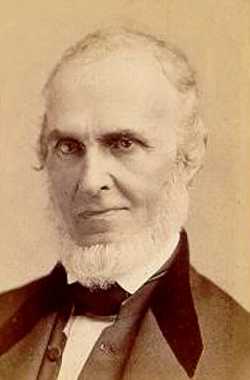 SKC Films Library SKC Films Library |
| SKC Films Library >> Linguistics, Languages, and Literatures >> American Literature >> 19th Century |
 John
Greenleaf Whittier John
Greenleaf Whittierpoet John Greenleaf Whittier was born in Haverhill, Massachusetts, on December 17, 1807, the first son and second child (another sister was born after him) of poor Quaker farmers. He attended the local Quaker school during the short "between farm seasons" terms and it was during one of those terms that he was introduced to poetry. His first published poem, "The Exile's Departure," was published in William Lloyd Garrison's Newburyport Free Press in 1826, and by the time he was twenty more than 80 of his poems had been published in various newspapers and magazines. From 1827 to 1828, he attended Haverhill Academy, during which time he supported himself by working as a shoemaker and school teacher. His first book of poems, Legends of New England in Prose and Verse, was published in 1831. Like the majority of his Quaker brethren, Whittier was a devout and active abolitionist. In addition to writing numerous newspaper articles calling for an end to slavery, he also edited two prominent abolitionist papers -- the American Manufacturer (Boston, 1830) and the Essex Gazette (Haverhill, 1830-1832) -- and was the editor of the New England Weekly Review from 1832 to 1833. He moved to Amesbury, Massachusetts, in 1836 to work for the American Anti-Slavery Society. In May of 1838, the offices of the Pennsylvania Freeman, of which Whittier was then the editor, were burned and sacked during the destruction of Pennsylvania Hall by a mob. The vast majority of Whittier's poems prior to the end of the Civil War reflected his anti-slavery views, including Justice and Expediency (1834), a long poem calling for an immediate end to slavery; "The Moral Warfare" (1838) and "Massachusetts to Virginia" (1843), both of which attack the injustices of slavery; and "Ichabod" (1850), which criticizes Senator Daniel Webster of Massachusetts for his role in the passage of the Compromise of 1850. Whittier was also active in politics during this period. He supported Henry Clay at the 1831 Republican National Convention, was an unsuccessful candidate for Congress in 1832, and served as a delegate to the Massachusetts Republican Convention in 1833. In 1834 he was elected as a Whig for one term in the Massachusetts State Legislature. He founded the anti-slavery Liberty Party in 1840, and made another unsuccessful bid for Congress in 1842. In the mid-1850's he worked for the formation of the Republican Party, and was an active supporter of John C. Frémont for President in 1856. Whittier helped found Atlantic Monthly in 1857, and from that time his poems focused less and less on slavery and more on religion, nature, and rural life. His ballads "Skipper Ireson's Ride" (1857) and "Telling the Bees" (1858) show his interest in the people, customs, legends, and settings of New England, and his long poem Snow-Bound (1866) tells of a family marooned in their farmhouse during a blizzard. Snow-Bound expanded Whittier's popularity greatly, and the money he earned from its sales allowed him to build a nice home in Amesbury, where he spent the rest of his life. John Greenleaf Whittier died in a friend's home in Hampton Falls, New Hampshire, on September 7, 1892. He is buried in a family plot in Union Cemetery, Amesbury. His Major Works Legends of New England in Prose and Verse
(1831) SOURCES SEE ALSO |
| SKC Films Library >> Linguistics,
Languages, and Literatures
>> American
Literature >> 19th Century This page was last updated on 05/27/2017. |